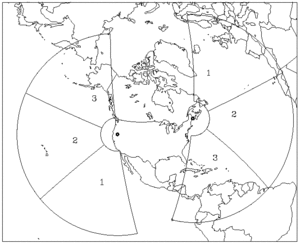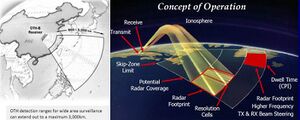Difference between revisions of "OTH Radar"
Jump to navigation
Jump to search
| (2 intermediate revisions by the same user not shown) | |||
| Line 1: | Line 1: | ||
[[File:Othb-cover-map.gif|thumb|right|Coverage Map of OTH-B coverage]] | [[File:Othb-cover-map.gif|thumb|right|Coverage Map of OTH-B coverage]] | ||
| − | https://basicsaboutaerodynamicsandavionics.wordpress.com/2016/04/12/radar-electronic-countermeasure/ | + | Thanks to that unique design, OTH-B radar can detect aircraft thousands of kilometers away even if these aircraft fly at very low altitude. However, since OTH-B radar use very low frequency, they are not only highly inaccurate but also required antennas which are extremely large, the height of each individual antenna often as high as 15-20 meters while the whole radar array often between 2-3 km long. Furthermore, the receiving and transmitting array need to be separated and stationed around 150-200 km away from each other. Due to their extreme size, OTH radars are large and stationary targets <ref>Radar Fundamentals (Part I): https://basicsaboutaerodynamicsandavionics.wordpress.com/2016/04/12/radar-electronic-countermeasure</ref><ref>CHAPTER IV |
| + | Limitations Imposed on Radar by External Factors: https://www.ibiblio.org/hyperwar/USN/ref/RADONEA/COMINCH-P-08-04.html | ||
| + | </ref> | ||
| − | https:// | + | |
| + | [[File:Over The Horizon Targeting .jpg|thumb|center]] | ||
| + | |||
| + | |||
| + | |||
| + | |||
| + | ==References== | ||
| + | |||
| + | |||
| + | <html> | ||
| + | <head> | ||
| + | <meta name="twitter:card" content="summary_large_image"> | ||
| + | <meta name="twitter:site" content="@indio007"> | ||
| + | <meta name="twitter:creator" content="@"> | ||
| + | <meta name="twitter:title" content="Over-the-horizon RADAR"> | ||
| + | <meta name="twitter:description" content="OTH-B radar can detect aircraft thousands of kilometers away"> | ||
| + | <meta name="twitter:image" content="https://wiki.247flatearth.net/images/thumb/1/11/Othb-cover-map.gif/450px-Othb-cover-map.gif"> | ||
| + | </body> | ||
| + | </html> | ||
Latest revision as of 18:38, 13 December 2020
Thanks to that unique design, OTH-B radar can detect aircraft thousands of kilometers away even if these aircraft fly at very low altitude. However, since OTH-B radar use very low frequency, they are not only highly inaccurate but also required antennas which are extremely large, the height of each individual antenna often as high as 15-20 meters while the whole radar array often between 2-3 km long. Furthermore, the receiving and transmitting array need to be separated and stationed around 150-200 km away from each other. Due to their extreme size, OTH radars are large and stationary targets [1][2]
References
- ↑ Radar Fundamentals (Part I): https://basicsaboutaerodynamicsandavionics.wordpress.com/2016/04/12/radar-electronic-countermeasure
- ↑ CHAPTER IV Limitations Imposed on Radar by External Factors: https://www.ibiblio.org/hyperwar/USN/ref/RADONEA/COMINCH-P-08-04.html



